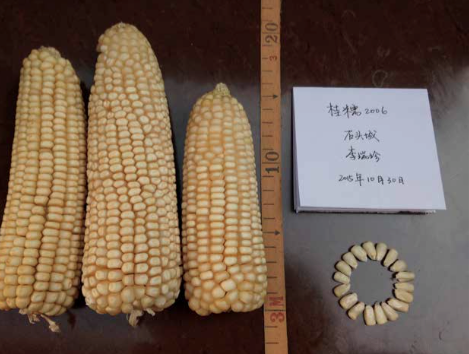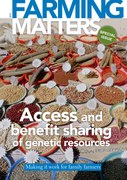In a special issue of Farming Matters, ILEIA and Bioversity International embark on a joint effort to document lessons learned in access and benefit sharing of genetic resources for and by family farmers. Why is this necessary?
For family farmers, maintaining biodiversity is an essential pillar of their strategies. This is all the more so for farmers who work from an agroecological approach, using the functions of nature to strengthen farming systems. Biodiversity helps to keep farms resilient to climatic and other shocks by improving water retention, increasing crop diversity, improving pollination, ensuring clean water and ensuring healthy soils that absorb carbon. In addition, diversity on farms tends to lead to diverse diets, a prerequisite for food and nutrition security.
Farmers (and especially women) have been the custodians of the world’s biodiversity through saving, using, exchanging and selling seed and propagating material. The rights of farmers to do this are a core component of the International Treaty on Plant Genetic Resources for Food and Agriculture (ITPGRFA). The same is true for their right to participate in decision making and in the fair and equitable sharing of benefits arising from the use of plant genetic resources and the need to protect traditional knowledge relevant to these resources. However, the implementation of Farmers’ Rights at national levels is not advancing rapidly.
Farmers’ Rights are closely linked to access and benefit sharing (ABS). As we see in this special issue of Farming Matters, there are various examples of ‘informal’ community seed banks that are highly effective, and of successful collaborations between researchers and farmers, some of which have links with the formal system.
Countries’ ratification of the ITPGRFA and the freshly minted Nagoya Protocol open the door for such new arrangements between farmers, farming communities, NGOs, universities, and public and private sector plant breeding and seed producing organisations. These collaborations can build bridges between the so-called formal and informal sectors building on the strengths, and overcoming the challenges associated with both systems. Hence, this issue further explores the interface between the formal and the informal system and highlights creative access and benefit sharing arrangements that are effective for family farmers.
We hope that the lessons learned in these arrangements, a selection of which is presented in a special issue of Farming Matters, will inspire and help policy actors, scientists and practitioners to develop similarly inspired access and benefit sharing arrangements in the future, and will assist them to ‘think-through’ options for domestic implementation of the multilateral system of access and benefit sharing and the Nagoya Protocol.
It is no coincidence that women farmers play a central role in biodiversity conservation and in many successful mechanisms for access and benefit sharing. They should have a guiding voice in dialogues on the future of ABS systems, engaging farmers, innovative scientists, policy actors and urban citizens.
We appreciate the opportunity for exchange that this collaboration between our two institutions has provided. Strengthening family farmers as guardians of the world’s great agrobiodiversity is a mission we share. We believe this publication provides valuable insights on how to do so.
Edith van Walsum is the Director of ILEIA, the Centre for learning on sustainable agriculture, The Netherlands
Michael Halewood is Leader of the Policies, Institutions and Monitoring Component, Bioversity International Italy


